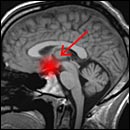Us and Them
JANUARY 13, 2007 Listen to this Story
Web Resources
Often on Martin Luther King Jr. Day we get asked to treat one another like brothers and sisters. But recent research about the brain may point to reasons why this brother and sisterhood never seems to come about. It shows that the portion of the brain that controls fear is activated when encountering the face of someone who is "other." But Neuroscientist Robert Sapolsky wrote an essay at Edge.org about his hope that the us/them dichotomy can become more benign.
With The Right Sort Of Priorities And Human Engineering (Whatever That Phrase Means), We Can Be Biased Towards Making Us/Them Dichotomies Far More Benign
by Robert Sapolsky
A truly discouraging thing to me is how easily humans see the world as dichotomized between Us and Them. This comes through in all sorts of ways—social anthropology, lord of the flies, prison experiments, linguistics (all those cultures where the word for the members of that culture translates into "People," thus making a contrast with the non-people living in the next valley).
As a neurobiologist, I'm particularly impressed with and discouraged by one finding relevant to this. There's a part of the brain called the amygdala that has lots to do with fear and anxiety and aggression. Functional brain imaging studies of humans show that the amygdala becomes metabolically active when we look at a scary face (even when the face is flashed up so quickly that we aren't consciously aware of seeing it). And some recent work—solid, done by top people, independently replicated — suggests that the amygdala can become activated when we view the face of someone from another race. The Them as scary, and the Them being someone whose skin color is real different from our own.
Damn, that's an upsetting finding.
But right on the heels of those studies are follow-ups showing that the picture is more complicated. The "Other skin color = scared activated amygdala = the Other" can be modified by experience. "Experience," can be how diverse of a world you grew up in. More diversity, and the amygdala is likely to become activated in that circumstance. And also, "experience," can be whether, shortly before your amygdala is put through the brain imaging paces, you are subtly biased to think about people categorically or as individuals. If you're cued towards individuating, your amygdala doesn't light up.
Thus, it seems quite plausible to me that we are hard-wired towards making Us/Them distinctions and not being all that nice to the Them. But what is anything but hard-wired is who counts as an Us and as a Them—we are so easily manipulated into changing those categories.
So, I'm optimistic that with the right sort of priorities and human engineering (whatever that phrase means), we can be biased towards making Us/Them dichotomies far more benign than they tend to be now. Say, by making all of us collectively feel like an Us with Them being the space aliens that may attack us some day. Or making the Them to be mean, shitty, intolerant people without compassion.
But, I'm sure not optimistic that we'll soon be having political, religious or cultural leaders likely to move us effectively in that direction. Just to deflate that optimism.
Read the article on Edge.com-
- Music Bridge:
- West Coast Blues
- Artist: Pat Martino
- CD: Blue Note








Comments
Comment | Refresh
Post a Comment: Please be civil, brief and relevant.
Email addresses are never displayed, but they are required to confirm your comments. All comments are moderated. Weekend America reserves the right to edit any comments on this site and to read them on the air if they are extra-interesting. Please read the Comment Guidelines before posting.
You must be 13 or over to submit information to American Public Media. The information entered into this form will not be used to send unsolicited email and will not be sold to a third party. For more information see Terms and Conditions and Privacy Policy.